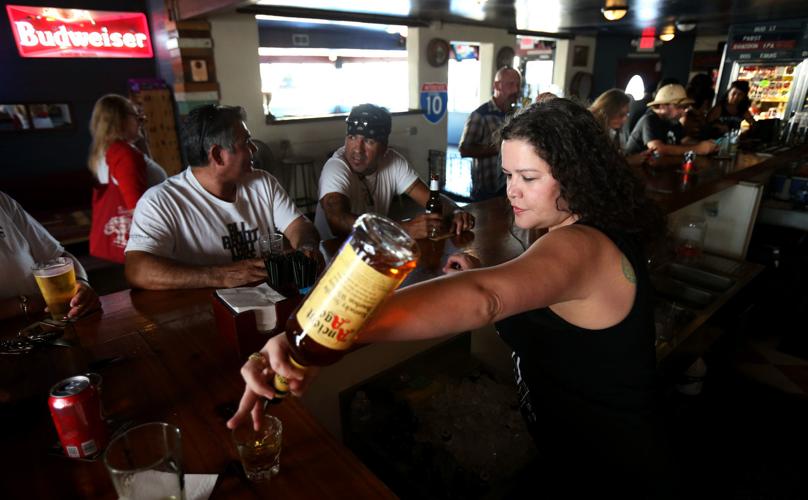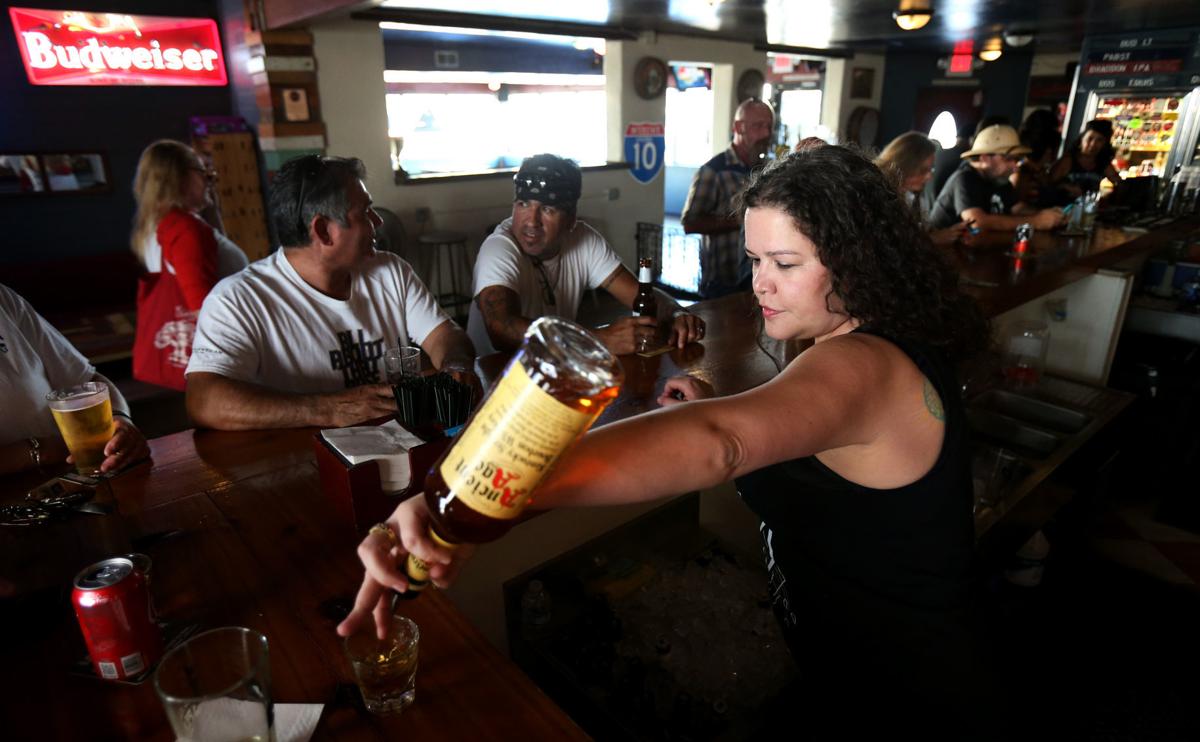The economy hasn’t stopped. Manufacturers are still churning out products. Distributors are distributing them. Even some retailers are selling.
But the businesses we cherish and identify with, the ones that make this community a community — they’re closed.
The coffee shops and restaurants, bars and movie theaters, bowling alleys and gyms. The places we go when we’re not at work or at home. The places we hang out. They’re not just closed — many are endangered if the shutdown goes on too long.
It’s the cruel nature of the pandemic. The places we gather to enjoy each other and ourselves are the places that raise the risk of transmission by our sheer proximity.
Equally cruel: These also tend to be businesses that are small and locally owned, financially fragile by their nature.
“Anything that involves gathering together in groups, particularly larger groups, got hit hard and got hit first,” said University of Arizona economist George Hammond, director of the Eller College’s Economic and Business Research Center.
Places like Catalina Brewing Co., a bike-themed brewery near West Ina Road and Interstate 10, at 6918 N. Camino Martin. They’re selling beer on a take-out basis, but it’s not the same, said co-owner Brian Vance.
“The people that love coming here and miss being here are the ones who are coming in and getting beer,” he said. “They get their beer, with the little X’s on the floor 6 feet apart. Our regulars are in once a week, but it’s not enough.”
He’s paid some bills with personal money and got the OK not to make payments for a few months to credit card companies and on a Small Business Administration loan.
“We’re a month in, and we’re OK, but if it’s two months it’ll be more challenging,” Vance said.
What made the timing especially bitter for Vance and his partners was that the business had just made it through two difficult years when the Ina Road exit at I-10 was closed.
“We were finally paying the bills and feeling like we were on track, and then this happened,” he said.
One of the risks for places like Catalina Brewing is that owners are on the line personally for loans.They could lose their homes or other possessions if a lender is unforgiving. In that case, there’s little hope for these cherished haunts to come back.
“They’ve attached their own wealth and living situation to these businesses,” said Ray Flores, president of Flores Concepts, which owns the El Charro restaurants. “They could lose their income and their home at the same time.”
The owners of an arcade just off North Fourth Avenue, D&D Pinball, announced Friday they are closing, in large part to avoid digging themselves into a deeper financial hole.
Over the short term, the outlook is not great for these gathering places. On Thursday, the White House issued guidelines for how and when the states should allow closed businesses to re-open. State governments aren’t obligated to follow the guidelines, but they’re likely to be used as Arizona Gov. Doug Ducey considers relaxing restrictions.
The first criteria are that flu-like illnesses and COVID-19-like syndromes be on a downward trajectory for a 14-day period; that documented COVID cases be headed downward over a 14-day period; that hospitals be able to treat all patients without crisis care; and that a robust testing program be in place for at-risk health-care workers.
Only when all that happens does the White House recommend proceeding to reopening some closed businesses. Restaurants and gyms, the guidance says, should only be able to open under distancing guidelines that keep people far enough apart. Bars should remain closed. After that, when states achieve the first criteria a second time without a rebound in cases, the guidance recommends moving on to a second stage, one in which bars should be allowed to open.
It’s going to be a tough time for these gathering places, the UA’s Hammond said as he pored over worrisome economic models. Not only were they the first businesses to be hit by closures, but they will also be hurt by decreased spending as the shock reverberates through the economy. The UA, for example, announced big pay cuts and furloughs that will take effect over the next year.
“Those sectors that rely on close social interaction — restaurants, movie theaters, travel — get hit hard by social distancing. Then they get hit again,” Hammond said.
Over at another bike-themed business, on the northeast side, Le Buzz Caffe is still serving to-go coffee to the ride-up crowd, supervisor Kyle Lux said. But it’s not enough to sustain the normally busy spot at 9121 E. Tanque Verde Road.
“A lot of people want to sit down, have a cup of coffee, open their laptop and hang out for an hour,” Lux said. “Until we open up fully, we can’t expect that kind of business to return.”
While others are doing take-away business, Elizabeth Menke, the owner of Saint Charles Tavern in South Tucson, has shut the doors tight.
“It’s not quite worth it,” she said, to try to carry on some piece of the business. Instead, she said, she’s “waiting it out, doing small projects over time, and hoping that all the small businesses make it out of this.”
But some of the connections that people usually make over a beer at the bar are still happening, she said.
“Our whole team is in conversation with all of our regulars, in a spider web of communication, checking in with each other,” she said.
Moral support and take-out orders — that’s pretty much what we can do till we can gather again at the businesses that make Tucson our home.
Photos for April 11: Tucson gets by during Coronavirus Pandemic
Tucson in photos, coronavirus pandemic
Updated
Susan Hillman chats with her mother Betty Hillman via telephone, April 9, 2020, Tucson, Ariz. Eighty-five year old Betty Hillman is in long term skilled care and Susan is unable to visit due to COVID-19 restrictions on nursing home facilities.
Tucson in photos, coronavirus pandemic
Updated
Susan Hillman chats with her mother Betty Hillman near a photo of Betty and her husband, Susan's dad, Bill, circa 2105, April 9, 2020, Tucson, Ariz. Eighty-five year old Betty Hillman is in long term skilled care and Susan is unable to visit due to COVID-19 restrictions on nursing home facilities.
Tucson in photos, coronavirus pandemic
Updated
Ben Forbes, left, owner of Forbes Meat Company, helps Jeronimo "Mo" Madril, right owner and executive chef of Geronimo's Revenge, wrap up tortilla's for to-go carnitas for Forbes Meat Company and Geronimo's Revenge's "Carnitas for the community" at Thunder Canyon Brewery, 220 E. Broadway Blvd., in Tucson, Ariz., on April 6, 2020. Forbes Meat Company and Geronimo's Revenge partnered to help the restaurant community by offering free carnitas to those affected by the Coronavirus Disease (COVID-19). They will be making to go carnitas every Monday in April starting at 2pm until all the to go packs, roughly 60, are all gone. Forbes wanted to find a way to help out the restaurant community. "They are struggling and my business is exploding," said Forbes.
Tucson in photos, coronavirus pandemic
Updated
David Clark, left, out of work bartender, and Jeronimo "Mo" Madril, owner and executive chef of Geronimo's Revenge, practice social distancing while waiting to give out carnitas for Forbes Meat Company and Geronimo's Revenge's "Carnitas for the community" at Thunder Canyon Brewery, 220 E. Broadway Blvd., in Tucson, Ariz., on April 6, 2020. Forbes Meat Company and Geronimo's Revenge partnered to help the restaurant community by offering free carnitas to those affected by the Coronavirus Disease (COVID-19). They will be making to go carnitas every Monday in April starting at 2pm until all the to go packs, roughly 60, are all gone.
Tucson in photos, coronavirus pandemic
Updated
Steve Tracy, Thunder Canyon Brewery co-owner and brewer, fills up 16oz bottles of locally made hand sanitizer at Thunder Canyon Brewery, 220 E. Broadway Blvd., in Tucson, Ariz., on April 6, 2020. Thunder Canyon Brewery, along with a few other local distilleries, are making United States Food and Drug Administration approved hand sanitizer for hospitals, first responders and the public in response to Coronavirus Disease (COVID-19). "Whatever I have, I am turning into hand sanitizer," said Tracy. "We are going to keep making it as much as we can."
Tucson in photos, coronavirus pandemic
Updated
Steve Tracy, Thunder Canyon Brewery co-owner and brewer, fills up 16oz bottles of locally made hand sanitizer at Thunder Canyon Brewery, 220 E. Broadway Blvd., in Tucson, Ariz., on April 6, 2020. Thunder Canyon Brewery, along with a few other local distilleries, are making United States Food and Drug Administration approved hand sanitizer for hospitals, first responders and the public in response to Coronavirus Disease (COVID-19). "Whatever I have, I am turning into hand sanitizer," said Tracy. "We are going to keep making it as much as we can."
Tucson in photos, coronavirus pandemic
Updated
David Sbarra, a psychology professor at the University of Arizona, points his webcam at his children Margot, 9, and Mateo, 12, as he begins his introduction of his office hours for a class he now conducts over Zoom in his living room while teaching from home, on April 7, 2020.
Tucson in photos, coronavirus pandemic
Updated
Ben Elias, manager at Westbound, center, helps Dustin Schaber with his pickup order on April 8, 2020. Due to the coronavirus disease (COVID-19) only two customers are allowed in the shop, located at the MSA Annex, at the same time and all orders are to-go.
Tucson in photos, coronavirus pandemic
Updated
Laura Tanzer, a local fashion designer, posted on Facebook that she will make masks for $5.00 each on April 5. Tanzer thought she would receive a couple of dozen orders, but, within 24 hours she heard from over 200 people. Tanzer is now working out of her shop in downtown Tucson making masks that also has a filter sowed into them. Tanzer is wearing one of her masks as she sows on April 8, 2020.
Tucson in photos, coronavirus pandemic
Updated
Oro Valley Hospital chief administration officer Erinn Oller talks with Fang, a local organizer with the Chinese-American COVID-19 Relief AZ group, which donated 6,000 masks, on April 9, 2020. Additional mask donations are planned as soon as shipments arrive.
Tucson in photos, coronavirus pandemic
Updated
Healthcare workers line up for their 2 free Sonoran hot dogs and a drink from BK Carne Asada & Hot Dogs in the parking lot of St. Mary's Hospital on April 10, 2020. The owner, Benny Galaz, is giving free food to healthcare workers at Tucson area hospitals for the next several weeks as a way to say thank you for their hard work during the coronavirus disease (COVID-19) outbreak.
Tucson in photos, coronavirus pandemic
Updated
Benny Galaz, owner of BK Carne Asada & Hot Dogs, cooks up Sonoran hot dogs in the parking lot of St. Mary's Hospital on April 10, 2020. Galaz is giving free food to healthcare workers at Tucson area hospitals for the next several weeks as a way to say thank you for their hard work during the coronavirus disease (COVID-19) outbreak.
Tucson in photos, coronavirus pandemic
Updated
Healthcare workers line up for their 2 free Sonoran hot dogs and a drink from BK Carne Asada & Hot Dogs in the parking lot of St. Mary's Hospital on April 10, 2020. The owner, Benny Galaz, is giving free food to healthcare workers at Tucson area hospitals for the next several weeks as a way to say thank you for their hard work during the coronavirus disease (COVID-19) outbreak.
Tucson in photos, coronavirus pandemic
Updated
A man uses the taped off exercise station in Reid Park as an anchor for his band workout, April 8, 2020, Tucson, Ariz.
Tucson in photos, coronavirus pandemic
Updated
Alicia Roseanna, 9, fourth grader at Esperanza Elementary School, grabs a sheet of paper while listening to her teacher, Rachel Watson, and her classmates inside her home in Tucson, Ariz. during Watson's online class on April 7, 2020. Due to the Coronavirus Disease (COVID-19) closing down schools and universities, teachers and students have been forced to schedule and participate in classes online for the remainder of the school year.
Tucson in photos, coronavirus pandemic
Updated
COVID-19 survivor, Glen Reed, poses for a photo looking out from the room he's using for isolation from his family in his home, April 10, 2020, Tucson, Ariz. Reed spent nearly a month in the hospital including weeks in ICU on a ventilator.
Tucson in photos, coronavirus pandemic
Updated
ER and EMS workers run through a drill practicing how to process an incoming patient experiencing a respiratory emergency at the Tucson Medical Center's Emergency Room, on April 10, 2020.
Tucson in photos, coronavirus pandemic
Updated
Tucson Fire Paramedic personnel prepare to run a drill at the Tucson Medical Center's Emergency Room, on April 10, 2020.
Tucson in photos, coronavirus pandemic
Updated
The CDC recommends Americans wear a facial covering when out in public, part of an effort to reduce the spread of the virus that causes COVID-19. Above, shopping for spring blooms at Tucson’s Green Things Nursery.
Tucson in photos, coronavirus pandemic
Updated
Coronavirus disease (COVID-19) signs taped onto dorms at the Babcock Dorms. The rooms located at 1717 E Speedway Boulevard may be used to house hospital workers from Banner - University Medical Center if they need to be quarantined due to COVID-19.
Tucson in photos, coronavirus pandemic
Updated
Alex Swain, a member of Beloved in the Desert - Tucson's chapter of the Episcopal Service Corps, packs the trunk of his housemate's SUV in the parking lot of Fry's on 2480 N Swan Road after grocery shopping for an elderly man, on April 3, 2020. Swain and his housemates have volunteered to shop for elderly and at risk populations as people quarantine and stay at home during the Coronavirus (COVID-19) pandemic.
Tucson in photos, coronavirus pandemic
Updated
Julisa Montano, a bus driver with Sunnyside Unified School District, gathers up the last few meals to hand out to students outside of Gallego Primary School, on April 7, 2020. The school district is distributing meals and has wifi available for students to use for school.
Tucson in photos, coronavirus pandemic
Updated
A table is taped off at Fred Enke Golf Course, 8251 E. Irvington Rd., in Tucson, Ariz., on April 5, 2020 due to Coronavirus Disease (COVID-19). With a rise in the amount of people participating in golf, due to Coronavirus Disease (COVID-19), Tucson City Golf is taking extra measures to keep people safe such as sanitizing golf carts after each use and social distancing.
Tucson in photos, coronavirus pandemic
Updated
Rich DelVecchio, a Fred Enke Golf Course employee, sanitizes a golf cart. Course revenues at Tucson’s city-owned golf properties are up nearly 28% from the same period last year.
Tucson in photos, coronavirus pandemic
Updated
Golfers practice social distancing while on the driving range at Fred Enke Golf Course, 8251 E. Irvington Rd., in Tucson, Ariz., on April 5, 2020. With a rise in the amount of people participating in golf, due to Coronavirus Disease (COVID-19), Tucson City Golf is taking extra measures to keep people safe such as sanitizing golf carts after each use and social distancing.






